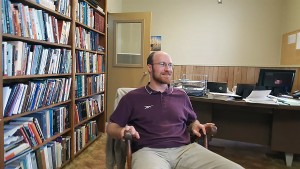Why do people help?

Brandon Taylor is photographed in his office at the Riverside Baptist Church on Oct. 14.
Photo by Rabiul Biplob
Rabiul Biplob
Local clergy and social workers say there are different reasons for why people donate their time, money and other resources to help others.
In Windsor different religious and social organizations have donors and volunteers who help to run their organizations. In 2005, a British study published in Personality and Social Psychology Bulletin showed bystanders are more likely to help strangers in distress when they recognize such strangers as belonging to a common group. However, what counts as group membership is not fixed.
Brandon Taylor, a pastor of Riverside Baptist Church, said God designed humans to be in relationship with one other and by helping each other, man can connect with God.
“Syrians are coming to our country and we are serving them,” said Taylor. “We have a built-in desire to show God’s love to everyone. Christians, who follow the guidance of Jesus Christ, are commanded to show love to everyone.”
He also said part of following Jesus Christ is to do works of social justice, taking care of those who cannot take care of themselves.
University of Minnesota psychologist Dr. Mark Snyder, studies volunteerism. In the mid-1980s, he and psychologist Dr. Allen Omoto, began studying volunteers providing care for patients with HIV/AIDS. Snyder, Omoto and their colleagues eventually surveyed volunteers of all ages who did all kinds of other community work. Over the years, they identified five primary motivations for volunteering: values, community concern; esteem enhancement, understanding and personal development.
Mirza Baig, secretary of Windsor Islamic Association, said they’ve had volunteers who help them throughout the years.
“We are biggest group of blood donors at Windsor Blood Services,” said Baig. “We have other services like coat drives for winter coats, food bank, a Ramadan food drive, fund raising for different events and an educational program for kids. For all the events, we get enough volunteers to help us.”
It’s hard to say people have often wondered whether helping is an inborn tendency or one that must be taught, and whether people ever help without receiving some benefit in return.
Social psychologist Robert Cialdini points out that empathy is directly tied into feelings of “oneness” with the person in need.
Others point to the importance of “we-ness,” feeling that another person is a member of your own group, an idea proposed by Yale psychologist John Dovidio and his colleagues, who have conducted extensive research on the factors that contribute to discrimination.
Baig said even if one put religion aside, Windsorites are part of the city and the country and it is a social responsibility to help others.
“Windsor Islamic Association is primarily created to serve the Muslims in the community. Part of the religion itself is to help the people of other faiths in the community,” said Baig.
Simon, in 1990, suggests that those who are the best have a competitive advantage. Thus, people are genetically programmed to learn social norms and one of these norms is altruism.
Social exchange theory argues that much of what people do stems from the desire to maximize the rewards and minimize the costs. Like evolutionary psychology, it is a theory based on self-interest, unlike it, it assumes that self-interest has no genetic basis.
The Buddhist faith includes a complex system of beliefs that reach back to Buddhism’s founder Siddhartha Guatama. He became the Buddha after, coming to the conclusion that desire leads to suffering and that the world suffered from an overall lack of compassion. From that point on, Guatama tried to help others liberate themselves from suffering, an effort that set an altruistic tone for his Buddhist followers to come.
Taylor said Christian people must help others who are suffering. He gave an example of his neighbour who died of cancer. When he found out that the woman had cancer, he requested everyone possible to help her within their capacity and people responded.
The Dalai Lama said the development of human society must be based entirely on people helping each other, and not just on pursuing material interests, such as a career or dream house. He also said, overall, the world has become so engrossed in materialism that, without even knowing it, man has neglected to foster the most basic human needs of love, kindness, cooperation and caring.
Baig said they do fundraising events for any kind of disaster happening in the world. They raise the fund and send the money or resources through Canadian Red Cross or the best organization for the circumstance.
During Ramadan, they ask people to donate $20 or buy nonperishable food and put those in a box they provide from the association. The food is then distributed to the Downtown Mission and other organizations so that they can be given to people in need.
Some social psychologists use social exchange theory to explain why people help others. They argue that people help each other because they want to gain as much as possible while losing as little as possible. The social responsibility norm also explains helping behavior. While being a societal rule that says they should help others who need it even if doing so is costly.
Whatever the reason, people help each other. Most of religious and non-religious organizations are funded by the general population.


